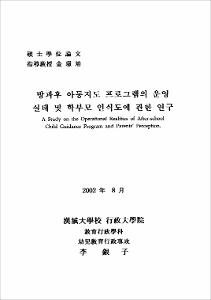방과후 아동지도 프로그램의 운영 실태 및 학부모 인식도에 관한 연구
= (A) study on the operational realities of after-school child guidance program and parents' perception
- Type
- Thesis
- Department
- 敎育行政學科幼兒敎育行政專攻
- Issued Date
- 2002
- Publisher
- 漢城大學校 行政大學院
- Keyword
- 방과후 지도; 아동지도 프로그램; after-school program
- Files in This Item:
-
-
Download
 000000066111.pdf
기타 데이터 / 3.28 MB / Adobe PDF
000000066111.pdf
기타 데이터 / 3.28 MB / Adobe PDF
-
Items in Repository are protected by copyright, with all rights reserved, unless otherwise indicated.